The 26th European Meeting of Cultural Journals held in Conversano
The 26th European Meeting of Cultural Journals took place in Conversano (Italy) from 3 to 6 October 2014. This meeting was organized by the European network of cultural journals, Eurozine, in cooperation with La Fondazione Giuseppe Di Vagno and Eurozine partner journal Lettera internazionale. More than 100 editors and intellectuals from Europe’s leading cultural journals participated in the event.
For more information about the conference, please read the conference report.
Thematic outline
Law and Border. House Search in Fortress Europe
Under the heading “Law and Border – House Search in Fortress Europe” the 2014 Eurozine conference addressed both the EU’s refugee and immigration policies, and intellectual partnerships across the Mediterranean (Eurozine Maghreb).
On 3 October 2013, over 360 men, women and children drowned off the coast of Lampedusa attempting to enter Europe. At the time, Italian president Giorgio Napolitano lamented the “slaughter of innocents” and the tragic event – one of many at the gates of Fortress Europe – triggered a new European debate on laws, borders and human rights.
Exactly one year after the Lampedusa shipwreck, we continued this debate, drawing on the fact that Eurozine is a transnational network, representing views and experiences from all parts of Europe – and beyond. The renewed focus on migrants landing on Europe’s Mediterranean shores has added to the difference of perspectives between southern and northern EU countries, which first surfaced with the economic crisis in 2008. Many southern frontier member states – Italy included – feel that they are being left alone to deal with the economic, legal and moral challenges, which come with refugees and asylum seekers. At the same time, the tensions between western and eastern Europe have never left the agenda. Populist politics demonizes immigrants per se; the most recent occasion for xenophobic rhetoric being the lifting of work restrictions on Romanians and Bulgarians earlier this year. There is a fortress within the fortress.
These are some of the current issues addressed at the Conversano meeting, which took place in a part of Europe that has a long history of dealing with migration. But we also asked intellectuals and experts to project current trajectories, trends, problems and possibilities into the future. Does increasing investment in surveillance – which has so far been the standard answer – really go to the core of the matter? More often than not, migrants have no choice but to flee conflict situations, poverty or environmental degradation. This fact will not go away. On the contrary, climate change and increased global inequality will only add to an already volatile situation. So, what is the future of migration?
Download: Conference programme
Conference focal point
We have launched a focal point on the topic of the meeting: Beyond Fortress Europe. Should you want to contribute to this focal point, please contact the Eurozine editors. Contributions may be newly written texts or articles already published in your journal.
From the archives “Have borders become irrelevant with the project of a united Europe?” asked Tatiana Zhurzhenko in the introduction to a Eurozine focal point on the Politics of border making published in 2005 after the so-called EU enlargement to the east. The answer then, ten years ago, was the same as it is today: “No, just the opposite!” Back then the emphasis was very much on eastern Europe, but most of these articles are as relevant as ever.
Social media
Tweets The Twitter hashtag of the conference is #eurozine2014.
Location
Conversano, Italy
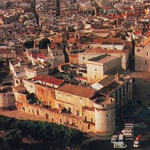 Conversano is a charming small town in the Italian region of Puglia (Apulia) with roots going back to pre-Roman times. Its entire historical city centre will serve as our conference venue. It is located at the foot of Murgia pugliese, seven kilometres from the Adriatic coast and known for its hospitality, fantastic food, art and culture. From here it’s not far to other tourist attractions in Puglia, such as Polignano a Mare and Monopoli. Bari and its international harbour, which saw the arrival of thousands of refugees during the “Albanian exodus” in the 1990s, is only 30 kilometres away.
Conversano is a charming small town in the Italian region of Puglia (Apulia) with roots going back to pre-Roman times. Its entire historical city centre will serve as our conference venue. It is located at the foot of Murgia pugliese, seven kilometres from the Adriatic coast and known for its hospitality, fantastic food, art and culture. From here it’s not far to other tourist attractions in Puglia, such as Polignano a Mare and Monopoli. Bari and its international harbour, which saw the arrival of thousands of refugees during the “Albanian exodus” in the 1990s, is only 30 kilometres away.
Conference venues
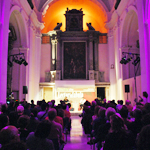 Auditorium San Giuseppe: The opening and closing sessions of the conference took place in San Giuseppe, a deconsecrated church built in the second half of the seventeenth century. The church is today used for meetings and exhibitions. Here writer and political historian Carlo Galli and the Italian artist Gek Tessaro presented their takes on the main theme of the conference.
Auditorium San Giuseppe: The opening and closing sessions of the conference took place in San Giuseppe, a deconsecrated church built in the second half of the seventeenth century. The church is today used for meetings and exhibitions. Here writer and political historian Carlo Galli and the Italian artist Gek Tessaro presented their takes on the main theme of the conference.
Address: Via San Giuseppe, 6
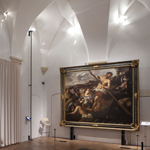 Pinacoteca: The welcome reception took place in the Pinacoteca in the castle, which for centuries was the residence of the Counts of Conversano. It includes rooms built between the late fifteenth and early sixteenth century. Inside, we dined under Paolo Finoglio’s cycle of paintings depicting Torquato Tasso’s Gerusalemme Liberata.
Pinacoteca: The welcome reception took place in the Pinacoteca in the castle, which for centuries was the residence of the Counts of Conversano. It includes rooms built between the late fifteenth and early sixteenth century. Inside, we dined under Paolo Finoglio’s cycle of paintings depicting Torquato Tasso’s Gerusalemme Liberata.
Address: Corso Domenico Morea, 2
 Teatro Norba: Some of the events during the conference were open to the public, including a reading by Fabrizio Gatti, author of Bilal, an internationally acclaimed undercover reportage following “the slave route to Europe”. These took place in Teatro Norba. Norba was the name of Conversano as it was settled as early as the Iron Age.
Teatro Norba: Some of the events during the conference were open to the public, including a reading by Fabrizio Gatti, author of Bilal, an internationally acclaimed undercover reportage following “the slave route to Europe”. These took place in Teatro Norba. Norba was the name of Conversano as it was settled as early as the Iron Age.
Address: Piazza della Repubblica, 10
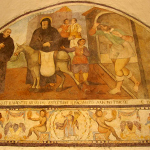 Chiostro dei Paolotti: Two of the main conference sessions took place in the Chiostro dei Paolotti, a convent built in 1619.
Chiostro dei Paolotti: Two of the main conference sessions took place in the Chiostro dei Paolotti, a convent built in 1619.
Address: Via Paolotti, 2
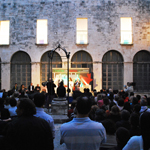 Monastero di San Benedetto: Exhibitions, workshops and film screenings took place at the Saint Benedict Monastery, which dates back to the eleventh century and testifies to Conversano’s history. Between the thirteenth and nineteenth centuries, it was the seat of the abbesses, whose power and influence was on a level comparable to that of the bishops. Hence the epithet “Monstrum Apuliae”.
Monastero di San Benedetto: Exhibitions, workshops and film screenings took place at the Saint Benedict Monastery, which dates back to the eleventh century and testifies to Conversano’s history. Between the thirteenth and nineteenth centuries, it was the seat of the abbesses, whose power and influence was on a level comparable to that of the bishops. Hence the epithet “Monstrum Apuliae”.
Address: Via San Benedetto, 18
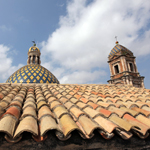 Fondazione Di Vagno: San Benedetto is also the seat of the Fondazione Giuseppe Di Vagno. Here, Advisory and Editorial Board meetings were held. The foundation, named after the first socialist deputy to the national parliament and a victim of fascist violence in 1921, promotes studies and research relating to the history of socialism in Italy and in Puglia and organizes a range of activities, including the annual festival of culture “Lector in fabula”.
Fondazione Di Vagno: San Benedetto is also the seat of the Fondazione Giuseppe Di Vagno. Here, Advisory and Editorial Board meetings were held. The foundation, named after the first socialist deputy to the national parliament and a victim of fascist violence in 1921, promotes studies and research relating to the history of socialism in Italy and in Puglia and organizes a range of activities, including the annual festival of culture “Lector in fabula”.
Address: Via San Benedetto, 18
About Puglia
Region
 Puglia is a region in southern Italy bordering the Adriatic Sea in the east, the Ionian Sea to the southeast, and the Strait of Òtranto and Gulf of Taranto in the south. It forms the “heel” on the Italian “boot” and offers a range of places to discover and enjoy, whether one is interested in nature, history or art. When wining and dining in Puglia, one may feel spoilt for choice in terms of renowned delicacies: the bread of Altamura Dop, the capocollo (capicola) of Martina Franca, the bombette of Cisternino (small beef rolls stuffed with cheese, ham and lettuce), extra-virgin oils and Primitivo, Negroamaro and Nero di Troia wines. Puglia is a land full of life, offering a rich calendar of events throughout the year, from major festivals of culture to live concerts, film festivals and art exhibitions.
Puglia is a region in southern Italy bordering the Adriatic Sea in the east, the Ionian Sea to the southeast, and the Strait of Òtranto and Gulf of Taranto in the south. It forms the “heel” on the Italian “boot” and offers a range of places to discover and enjoy, whether one is interested in nature, history or art. When wining and dining in Puglia, one may feel spoilt for choice in terms of renowned delicacies: the bread of Altamura Dop, the capocollo (capicola) of Martina Franca, the bombette of Cisternino (small beef rolls stuffed with cheese, ham and lettuce), extra-virgin oils and Primitivo, Negroamaro and Nero di Troia wines. Puglia is a land full of life, offering a rich calendar of events throughout the year, from major festivals of culture to live concerts, film festivals and art exhibitions.
More information on the region of Puglia